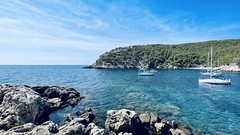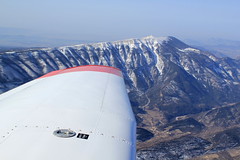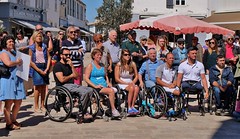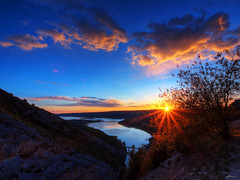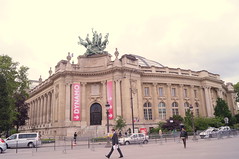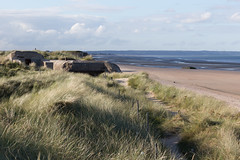 France
France
France (French: [fʁɑ̃s]) officially the French Republic (French: [ʁepyblik fʁɑ̃sɛz]), is a country located primarily in Western Europe. It also includes overseas regions and territories in the Americas and the Atlantic, Pacific and Indian Oceans, giving it one of the largest discontiguous exclusive economic zones in the world. Its metropolitan area extends from the Rhine to the Atlantic Ocean and from the Mediterranean Sea to the English Channel and the North Sea; overseas territories include French Guiana in South America, Saint Pierre and Miquelon in the North Atlantic, the French West Indies, and many islands in Oceania and the Indian Ocean. Its eighteen integral regions (five of which are overseas) span a combined area of and had a total population of over 68 million . France is a unitary semi-presidential republic with its capital in Paris, the country's largest city and main cultural and commercial centre; other major urban areas include Marseille, Lyon, Toulouse, Lille, Bordeaux, and Nice.
Inhabited since the Palaeolithic era, the territory of Metropolitan France was settled by Celtic tribes known as Gauls during the Iron Age. Rome annexed the area in 51 BC, leading to a distinct Gallo-Roman culture that laid the foundation of the French language. The Germanic Franks formed the Kingdom of Francia, which became the heartland of the Carolingian Empire. The Treaty of Verdun of 843 partitioned the empire, with West Francia becoming the Kingdom of France in 987. In the High Middle Ages, France was a powerful but highly decentralised feudal kingdom. Philip II successfully strengthened royal power and defeated his rivals to double the size of the crown lands; by the end of his reign, France had emerged as the most powerful state in Europe. From the mid-14th to the mid-15th century, France was plunged into a series of dynastic conflicts involving England, collectively known as the Hundred Years' War, and a distinct French identity emerged as a result. The French Renaissance saw art and culture flourish, conflict with the House of Habsburg, and the establishment of a global colonial empire, which by the 20th century would become the second-largest in the world. The second half of the 16th century was dominated by religious civil wars between Catholics and Huguenots that severely weakened the country. France again emerged as Europe's dominant power in the 17th century under Louis XIV following the Thirty Years' War. Inadequate economic policies, inequitable taxes and frequent wars (notably a defeat in the Seven Years' War and costly involvement in the American War of Independence) left the kingdom in a precarious economic situation by the end of the 18th century. This precipitated the French Revolution of 1789, which overthrew the and produced the Declaration of the Rights of Man, which expresses the nation's ideals to this day.
France reached its political and military zenith in the early 19th century under Napoleon Bonaparte, subjugating much of continental Europe and establishing the First French Empire. The French Revolutionary and Napoleonic Wars shaped the course of European and world history. The collapse of the empire initiated a period of relative decline, in which France endured a tumultuous succession of governments until the founding of the French Third Republic during the Franco-Prussian War in 1870. Subsequent decades saw a period of optimism, cultural and scientific flourishing, as well as economic prosperity, known as the Belle Époque. France was one of the major participants of World War I, from which it emerged victorious at a great human and economic cost. It was among the Allied powers of World War II but was soon occupied by the Axis in 1940. Following liberation in 1944, the short-lived Fourth Republic was established and later dissolved in the course of the Algerian War. The current Fifth Republic was formed in 1958 by Charles de Gaulle. Algeria and most French colonies became independent in the 1960s, with the majority retaining close economic and military ties with France.
France retains its centuries-long status as a global centre of art, science and philosophy. It hosts the fifth-largest number of UNESCO World Heritage Sites and is the world's leading tourist destination, receiving over 89 million foreign visitors in 2018. France is a developed country with the world's seventh-largest economy by nominal GDP and tenth-largest by PPP. It remains a great power in global affairs, being one of the five permanent members of the United Nations Security Council and an official nuclear-weapon state. France is a founding and leading member of the European Union and the Eurozone, as well as a key member of the Group of Seven, North Atlantic Treaty Organization (NATO), Organisation for Economic Co-operation and Development (OECD) and Francophonie.
Etymology and pronunciation
Originally applied to the whole Frankish Empire, the name France comes from the Latin , or "realm of the Franks". Modern France is still named today in Italian and Spanish, while in German, in Dutch and in Swedish all mean "Land/realm of the Franks".
The name of the Franks is related to the English word frank ("free"): the latter stems from the Old French ("free, noble, sincere"), ultimately from Medieval Latin francus ("free, exempt from service; freeman, Frank"), a generalisation of the tribal name that emerged as a Late Latin borrowing of the reconstructed Frankish endonym . It has been suggested that the meaning "free" was adopted because, after the conquest of Gaul, only Franks were free of taxation, or more generally because they had the status of freemen in contrast to servants or slaves.
The etymology of *Frank is uncertain. It is traditionally derived from the Proto-Germanic word , which translates as "javelin" or "lance" (the throwing axe of the Franks was known as the francisca), although these weapons may have been named because of their use by the Franks, not the other way around.
In English, 'France' is pronounced English: /fræns/ in American English and English: /frns/ or English: /fræns/ in British English. The pronunciation with English: // is mostly confined to accents with the trap-bath split such as Received Pronunciation, though it can be also heard in some other dialects such as Cardiff English, in which English: /frns/ is in free variation with English: /fræns/.
History
Prehistory (before the 6th century BC)
The oldest traces of human life in what is now France date from approximately 1.8 million years ago. Over the ensuing millennia, humans were confronted by a harsh and variable climate, marked by several glacial periods. Early hominids led a nomadic hunter-gatherer life. France has a large number of decorated caves from the Upper Paleolithic era, including one of the most famous and best-preserved, Lascaux (approximately 18,000 BC). At the end of the last glacial period (10,000 BC), the climate became milder; from approximately 7,000 BC, this part of Western Europe entered the Neolithic era and its inhabitants became sedentary.
After strong demographic and agricultural development between the 4th and 3rd millennia, metallurgy appeared at the end of the 3rd millennium, initially working gold, copper and bronze, as well as later iron. France has numerous megalithic sites from the Neolithic period, including the exceptionally dense Carnac stones site (approximately 3,300 BC).
Antiquity (6th century BC–5th century AD)
In 600 BC, Ionian Greeks from Phocaea founded the colony of Massalia (present-day Marseille), on the shores of the Mediterranean Sea. This makes it France's oldest city. At the same time, some Gallic Celtic tribes penetrated parts of Eastern and Northern France, gradually spreading through the rest of the country between the 5th and 3rd century BC. The concept of Gaul emerged during this period, corresponding to the territories of Celtic settlement ranging between the Rhine, the Atlantic Ocean, the Pyrenees and the Mediterranean. The borders of modern France roughly correspond to ancient Gaul, which was inhabited by Celtic Gauls. Gaul was then a prosperous country, of which the southernmost part was heavily subject to Greek and Roman cultural and economic influences.
Around 390 BC, the Gallic chieftain Brennus and his troops made their way to Italy through the Alps, defeated the Romans in the Battle of the Allia, and besieged and ransomed Rome. The Gallic invasion left Rome weakened, and the Gauls continued to harass the region until 345 BC when they entered into a formal peace treaty with Rome. But the Romans and the Gauls would remain adversaries for the next centuries, and the Gauls would continue to be a threat in Italy.
Around 125 BC, the south of Gaul was conquered by the Romans, who called this region ("Our Province"), which over time evolved into the name Provence in French. Julius Caesar conquered the remainder of Gaul and overcame a revolt carried out by the Gallic chieftain Vercingetorix in 52 BC.
Gaul was divided by Augustus into Roman provinces. Many cities were founded during the Gallo-Roman period, including Lugdunum (present-day Lyon), which is considered the capital of the Gauls. These cities were built in traditional Roman style, with a forum, a theatre, a circus, an amphitheatre and thermal baths. The Gauls mixed with Roman settlers and eventually adopted Roman culture and Roman speech (Latin, from which the French language evolved). Roman polytheism merged with Gallic paganism into the same syncretism.
From the 250s to the 280s AD, Roman Gaul suffered a serious crisis with its fortified borders being attacked on several occasions by barbarians. Nevertheless, the situation improved in the first half of the 4th century, which was a period of revival and prosperity for Roman Gaul. In 312, Emperor Constantine I converted to Christianity. Subsequently, Christians, who had been persecuted until then, increased rapidly across the entire Roman Empire. But, from the beginning …
Hotels France
 citizenM Paris Gare de LyonParis
citizenM Paris Gare de LyonParis Hôtel Montaigne & SpaCannes
Hôtel Montaigne & SpaCannes Toyoko INN Marseille Saint CharlesMarseille
Toyoko INN Marseille Saint CharlesMarseille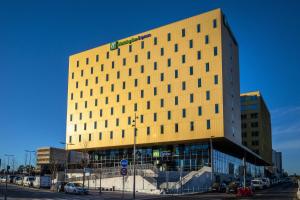 Holiday Inn Express - Nice - Grand Arenas, an IHG HotelNice
Holiday Inn Express - Nice - Grand Arenas, an IHG HotelNice Appart'Hotel Prestige Odalys NakâraLe Cap D'Agde
Appart'Hotel Prestige Odalys NakâraLe Cap D'Agde Résidence Prestige Odalys IsatisChamonix Mont Blanc
Résidence Prestige Odalys IsatisChamonix Mont Blanc Lagrange Aparthotel Lyon LumièreLyon
Lagrange Aparthotel Lyon LumièreLyon Odalys City Toulouse Centre Compans CaffarelliToulouse
Odalys City Toulouse Centre Compans CaffarelliToulouse
Looking for places related to France?
Those are other destinations to find places related to France:






